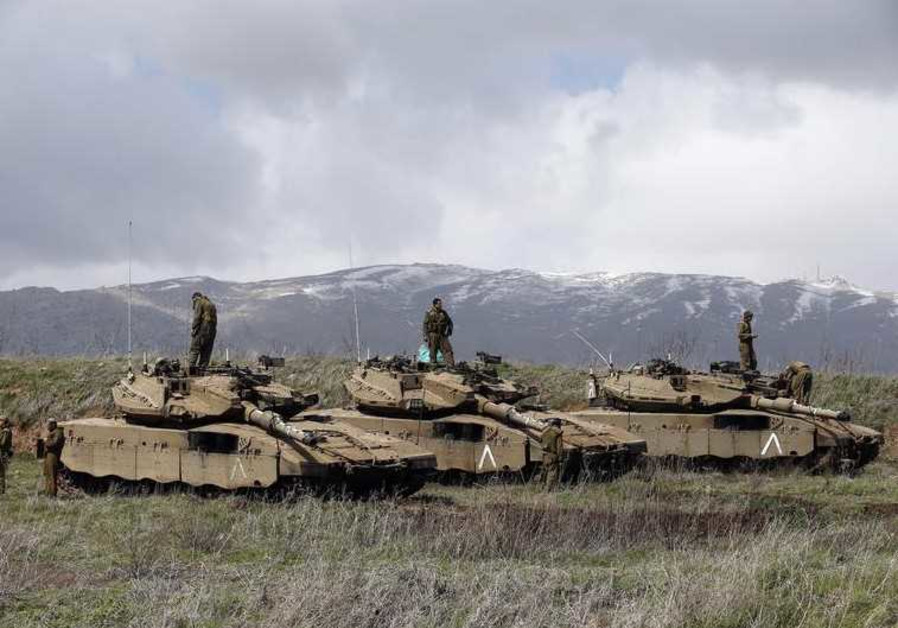Refugees and Iranian threat: Crisis in the Golan creates instability

Israeli soldiers stand atop tanks in the Golan Heights near Israel’s border with Syria. (photo credit: REUTERS)
The Syrian rebels in the town of Inkhil and Jasim began handing over weapons to the Syrian regime, just over ten kilometers from the Golan border with Israel.
At the same time the Syrian forces, backed by Russian air power and Iranian-supported militias, crept toward the border from the south, skirting a small pocket held by Islamic State.
The situation along the Golan is precarious. “Jasim and Nawa are getting squeezed, so a lot of people are filtering elsewhere,” said Dalton Thomas, founder of FAI Relief that has been working with Syrians displaced by the fighting who have crowded near the Golan border fence.
He says it may not look it from the outside, but the crises near the border is getting more severe.
On Friday the World Health Organization called for the protection of health facilities and increased access to southern Syria.
They said that 210,000 people had been displaced by the fighting and 160,000 Syrians were seeking safety near Quneitra where they had little access to health facilities.
“People in Dara’a and Quneitra are waiting for the humanitarian community to reach them with urgently needed aid and we cannot let them down, access must be granted,” Dr. Michel Thieren said Friday.
The issue of access has changed since the Syrian rebel areas were cut off from Jordan where they had received aid over the last seven years.
Now a route via Israel is a main conduit for aid to the displaced people. Over the last years Operation Good Neighbor has aided Syrians near the border, including treating thousands of wounded; however, a large scale humanitarian crises on the Golan is beyond what NGOs and aid organizations in Israel appear ready to handle.
Yet the World Health Organization says that 75% of public hospitals and health centers in Dara’a and Quneitra are closed.
FAI Relief has asked for more medical supplies and baby formula among the items needed across the border. Thomas said Israel is now the “last lifeline of Syrians suffering,” in a video posted online Saturday.
At the same time Israel faces a second threat across the border in the form of Iranian-backed units among the Syrian regime forces that are encroaching on Israel.
In a new report Aymenn Jawad Al-Tamimi, a research fellow at the Middle East Forum, argued that Iran’s Islamic Revolutionary Guard Corps is deeply integrated and an “indivisible part of the system” in Syria.
While Israel has said it wants Iran removed from Syria as the war winds down and the US has spoken about rolling Iranian influence back, this will be difficult to do, al-Tamimi says.
“Truly countering the IRGC, let along removing it from Syria entirely, would require the total dismantlement of the system itself, or at least going on the offensive, reducing the Syrian government area of control,” he writes.
This puts Israel in a difficult position. As the Syrian regime moves closer to the border the humanitarian pressure increased and a crises is developing. At the same time the Iranian regime wants to exploit the offensive along with its allies, such as Hezbollah, to move closer to Israel.
The situation on the Golan, overshadowed by the sirens and rockets in the south on Saturday, is in a combustible state.






Comments are closed.